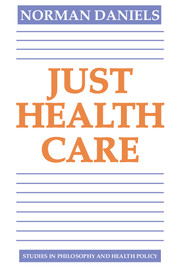Book contents
- Frontmatter
- Contents
- Preface
- Acknowledgements
- 1 Is health care special?
- 2 Health-care needs
- 3 Toward a distributive theory
- 4 Equity of access to health care
- 5 Am I my parents' keeper?
- 6 Doing justice to providers
- 7 Doth OSHA protect too much?
- 8 Risk and opportunity
- 9 Philosophy and public policy
- Works cited
- Index
5 - Am I my parents' keeper?
Published online by Cambridge University Press: 05 June 2012
- Frontmatter
- Contents
- Preface
- Acknowledgements
- 1 Is health care special?
- 2 Health-care needs
- 3 Toward a distributive theory
- 4 Equity of access to health care
- 5 Am I my parents' keeper?
- 6 Doing justice to providers
- 7 Doth OSHA protect too much?
- 8 Risk and opportunity
- 9 Philosophy and public policy
- Works cited
- Index
Summary
Must no one at all, then, be called happy while he lives; must we, as Solon says, see the end?
Aristotle, Nichomachaen EthicsOpportunity, age-bias, and competition for resources
If an acceptable general theory of distributive justice requires us to guarantee fair equality of opportunity, then a principle for the distribution of health care seems to follow. Institutions delivering health-care services, both preventive and curative, should be governed by the fair equality of opportunity principle. On this view, health care is ‘special’ because of its connection to the special social good, opportunity. Healthcare needs are things we need to maintain, restore, or compensate for the loss of normal species functioning. Impairment of normal functioning means that an individual might not enjoy his fair share of the range of opportunities normal for his society. Thus meeting health-care needs is as important as guaranteeing individuals that their opportunity is within the normal range for their society.
The fact that we age raises an important objection to the approach I have been developing. Any distributive theory for health care, we may suppose, should account for the importance of meeting the health-care needs of young and old alike. In the US system, people over the age of 65 use health-care services at roughly 3.5 times the rate (in dollars) of those below that age. In 1977, per capita expenditures for those over 65 in the US were $1,745; they were $661 for those age 16–64 and $253 for those under 19 (Gibson and Fisher 1979: 3–16).
- Type
- Chapter
- Information
- Just Health Care , pp. 86 - 113Publisher: Cambridge University PressPrint publication year: 1985
- 2
- Cited by



